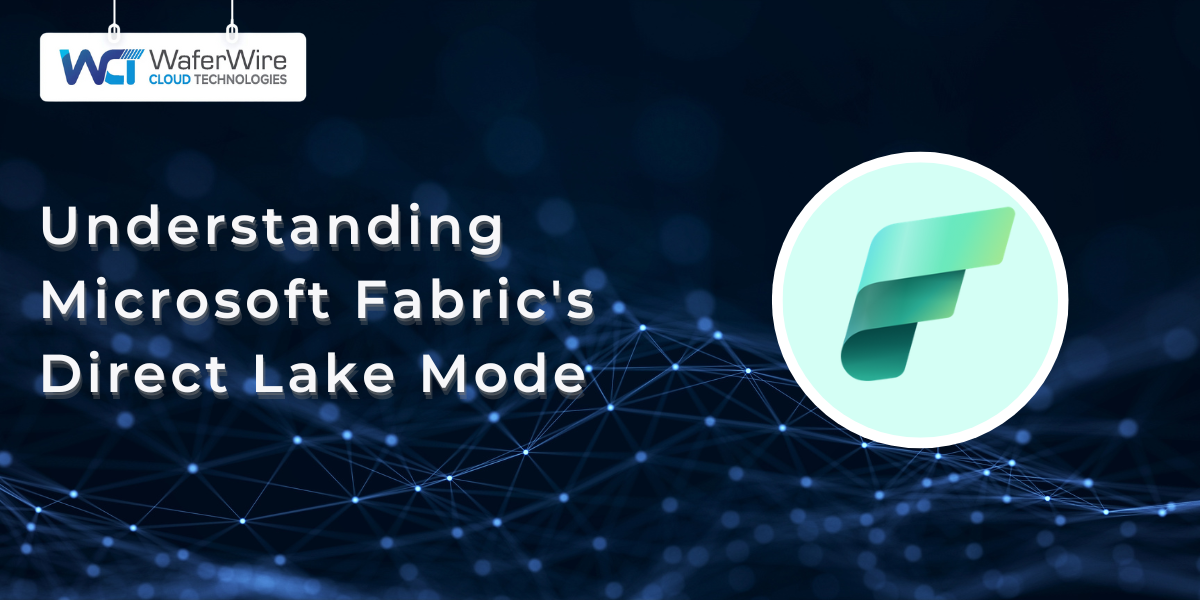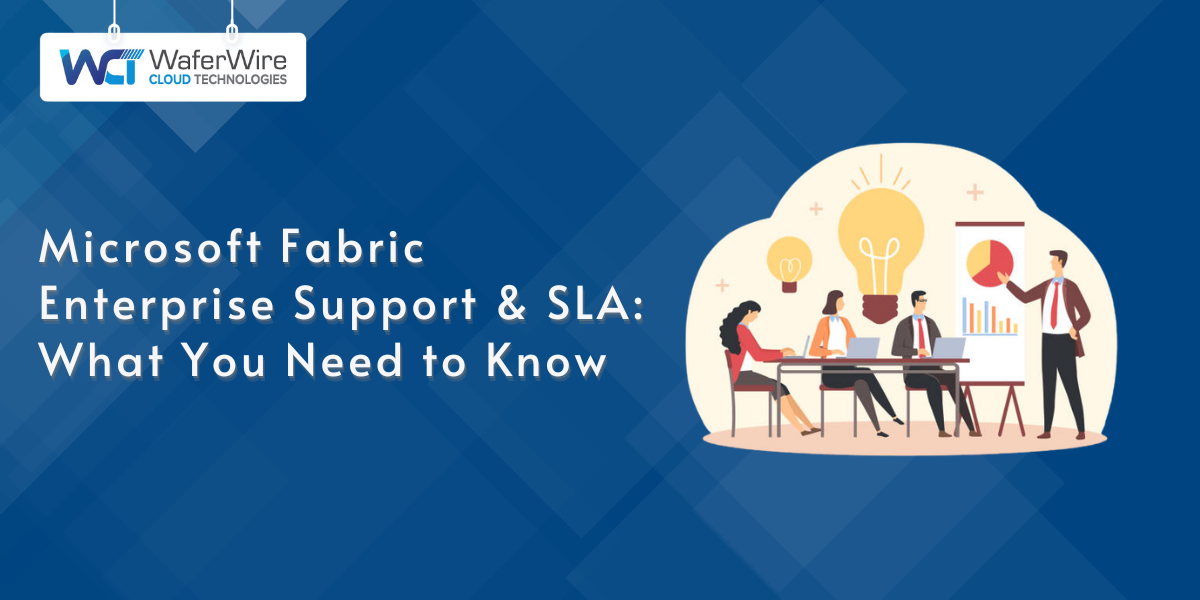
Thinking of Working with a Microsoft Fabric Partner? Here’s What to Expect
Mownika R.
2025-07-09
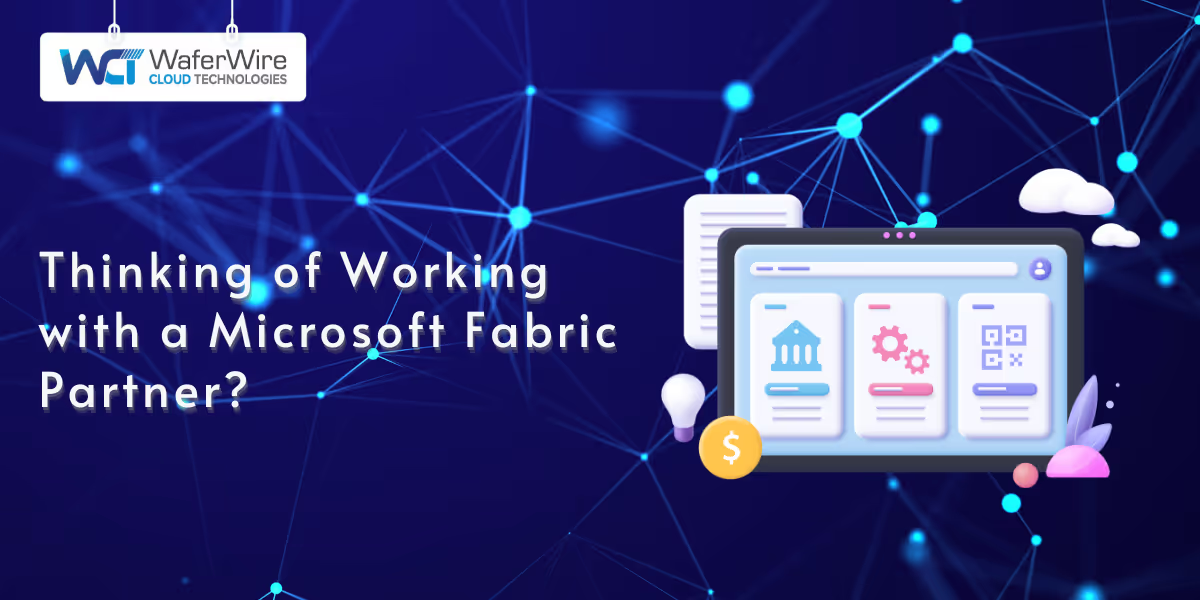
Talk to our cloud experts
Subject tags
Microsoft Fabric is a powerful platform designed to improve data management and analytics for organizations. To make the most of its features, seamless integration with trusted partners is essential.
Microsoft Fabric partners provide valuable solutions that support data integration, real-time intelligence, and multicloud access. From connecting to OneLake via Data Factory to using database mirroring for efficient data replication, the right partnerships can enhance your Microsoft Fabric experience.
In this blog, we will explore the integration pathways available through Microsoft Fabric partners, the resources they offer, and how these collaborations can help your business drive efficiency and innovation.
What Are Microsoft Fabric Partners?
Microsoft Fabric partners are specialized firms that collaborate with Microsoft to help businesses deploy and optimize the Microsoft Fabric platform. These partners bring expertise, ensuring that businesses can utilize the platform’s capabilities. By offering a range of services, from custom application development to strategic consulting, they help your organization customize Microsoft Fabric to meet your specific needs.
These partners play a critical role in supporting businesses throughout the deployment process. They guide organizations in navigating the complexities of integration, configuration, and ongoing optimization, ensuring that Microsoft Fabric delivers maximum value and aligns with business objectives.
Suggested Read: Introduction to Microsoft Fabric for Small and Medium-Sized Enterprises
How Can Microsoft Fabric Partners Benefit Your Business?
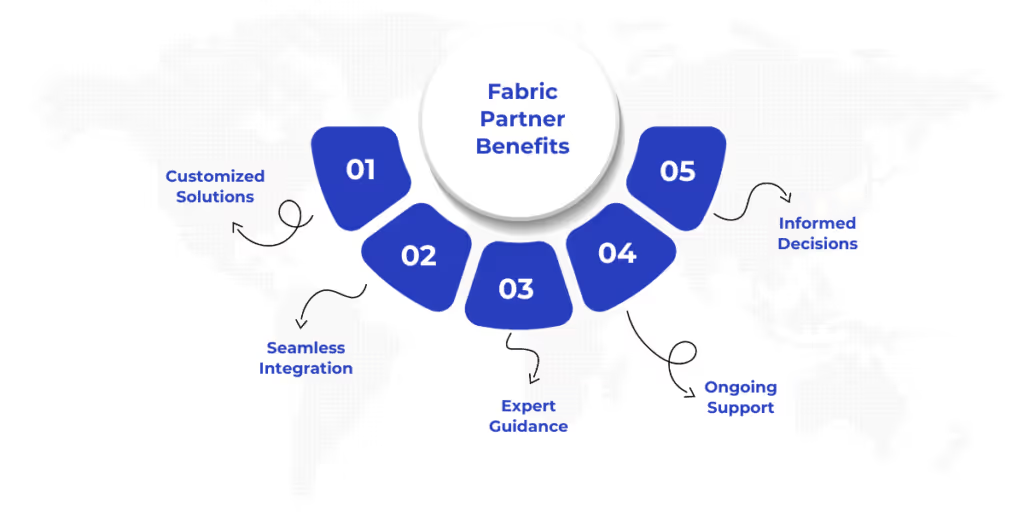
Partnering with Microsoft Fabric experts brings a host of benefits that can significantly enhance your business’s data capabilities. These partners offer specialized knowledge, ensuring that your organization can fully utilize the platform’s power to achieve greater efficiency and innovation.
Here's how Microsoft Fabric partners can make a real impact on your business:
- Customized Solutions: Partners tailor Microsoft Fabric to meet your specific business goals, ensuring you get the most relevant data management and analytics capabilities.
- Seamless Integration: They handle the complexities of integrating Microsoft Fabric into your existing infrastructure, ensuring a smooth and efficient deployment.
- Expert Guidance: With in-depth knowledge of the platform, partners provide insights on optimizing features and aligning Microsoft Fabric with your business needs.
- Ongoing Support: Partners offer continuous assistance, ensuring that your Microsoft Fabric platform remains up-to-date and performs optimally as your business grows.
- Informed Decisions: By maximizing the platform’s capabilities, partners help your business make data-driven decisions that support long-term success.
To get the most out of Microsoft Fabric, it’s important to work with the right kind of partner. Whether you need help with integration, strategic guidance, or specialized tools, each partner type offers distinct benefits. Let’s explore how each partner type plays a role in your Microsoft Fabric journey.
Types of Microsoft Fabric Partners

Microsoft Fabric partners can be categorized into three main types, each serving a unique function in the ecosystem. Understanding the differences between these partner types is crucial for organizations looking to integrate Microsoft Fabric into their operations effectively.
Here are the main types of Microsoft Fabric partners and the unique contributions they bring to the table:
1. Technology Partners
Technology partners enhance Microsoft Fabric by providing tools and technologies that integrate seamlessly with the platform. These partners typically offer:
- Data Integration Tools: Facilitating streamlined data ingestion and transformation processes within Microsoft Fabric.
- Analytics Solutions: Delivering advanced analytics and reporting features that integrate with the platform for actionable insights.
- Cloud Service Integrations: Offering cloud-based solutions that extend Microsoft Fabric’s data processing and storage capabilities.
2. Service Partners
Service partners specialize in deploying, implementing, and optimizing Microsoft Fabric within an organization’s existing infrastructure. They typically focus on:
- Implementation Services: Guiding businesses through the process of implementing Microsoft Fabric across their systems.
- Data Governance & Security: Providing guidance on data security, governance frameworks, and compliance, ensuring Microsoft Fabric meets regulatory requirements.
- Data Strategy Consulting: Assisting in creating end-to-end data strategies, ensuring businesses make the most of Microsoft Fabric’s data integration, visualization, and analytics features.
3. Consulting Partners
Consulting partners offer strategic, high-level guidance to businesses looking to customize and optimize their use of Microsoft Fabric. Consulting partners provide:
- Custom Application Development: Designing applications built on Microsoft Fabric to meet specific business requirements.
- Advanced Analytics & AI: Specializing in implementing machine learning models and AI-driven insights to enhance the data capabilities of Microsoft Fabric further.
- Business Transformation: Helping businesses embrace digital transformation, utilizing Microsoft Fabric to align data initiatives with strategic business objectives.
Each type of partner plays a vital role in extending Microsoft Fabric’s capabilities, offering tailored solutions that align with specific business needs. To bring these partnerships to life, it's essential to explore the key integrations that enhance the platform’s functionality and provide real-world value.
Also Read: Microsoft Fabric Features and Benefits Explained
Key Integrations with Microsoft Fabric Partners
Microsoft Fabric offers a comprehensive suite of integration pathways that enable businesses to connect with various data sources and platforms seamlessly. These integrations empower organizations to streamline data workflows and encourage collaboration across different environments.
Here are the key integrations that can help businesses maximize the benefits of Microsoft Fabric:
1. Interoperating with Microsoft Fabric
Independent Software Vendors (ISVs) and other partners can integrate their solutions with Microsoft Fabric's OneLake foundation through various methods like:
- Data Factory Connectors: Utilize connectors within Data Factory to ingest, transform, and orchestrate data workflows across multiple systems.
- Real-Time Intelligence: Leverage Real-Time Intelligence for event-driven scenarios, enabling the extraction of insights and actions on data in motion.
- REST APIs for OneLake: Access OneLake data using existing Azure Data Lake Storage (ADLS) Gen2 APIs and SDKs, facilitating direct interaction with data stored in OneLake.
- Shortcuts in OneLake: Create shortcuts within OneLake to reference data stored in external systems, enabling seamless data access and integration.
- Data Sharing Across Fabric Tenants: Share data securely across different Fabric tenants, promoting collaboration and data accessibility.
- Database Mirroring: Replicate data from various databases, such as Azure SQL Database, into OneLake, enabling near real-time analytics and insights.
2. Developing Applications on Microsoft Fabric
Partners can build custom applications directly within the Microsoft Fabric environment, utilizing its unified architecture to create tailored solutions for businesses.
Key features include:
- Custom Business Applications: Develop apps focused on data visualization, analytics, and decision support.
- Integration with Microsoft Ecosystem: Seamless integration with tools like Power BI, Azure Synapse, and Microsoft 365.
- End-to-End Data Solutions: Create solutions covering the entire data lifecycle—from ingestion to analysis.
3. Building Custom Workloads
Microsoft Fabric allows partners to build specialized workloads that extend the platform’s capabilities.
Some examples include:
- Advanced Machine Learning Models: Integrate analytics and machine learning for predictive insights and automation.
- Industry-Specific Workloads: Tailor solutions for specific industries, addressing unique technical or regulatory needs.
- Scalable Data Pipelines: Design custom data pipelines to manage large datasets and deliver real-time results.
The integrations we have discussed are made possible through the expertise of various Microsoft Fabric partners. These partners provide the specialized solutions that help businesses optimize their use of the platform. Let’s take a closer look at some of the key Microsoft Fabric partners and the role they play.
Key Microsoft Fabric Partners to Know
Several partners play an important role in enhancing Microsoft Fabric’s capabilities, offering solutions that address various business needs. These partnerships contribute to a more efficient, scalable approach to data management and analytics, providing organizations with the tools to improve decision-making and streamline operations.
Here are some of the standout partners making a significant impact:
- WaferWire: A trusted Microsoft partner, WaferWire specializes in implementing and optimizing Microsoft Fabric, offering services in data strategy, AI/ML, analytics, and data governance.
- LSEG (London Stock Exchange Group): Enhances financial services with advanced data and AI solutions, enabling improved data discovery and access.
- Esri: Provides spatial analytics and location intelligence, allowing deeper insights through geographic data integration.
- Informatica: Offers cloud data management solutions, transforming complex data into actionable insights with AI-driven capabilities.
- SAS: Delivers an open, cloud-native platform for AI, analytics, and data management to support data-driven decisions.
- Teradata: Supplies cloud analytics and data platforms, helping businesses leverage AI and machine learning for innovation.
These partners play a crucial role in making Microsoft Fabric more powerful and adaptable to a wide range of business needs.
Conclusion
Getting started with Microsoft Fabric enables you to break down data silos and act on valuable insights that drive innovation. By utilizing the platform’s unified data management and analytics capabilities, your organization can enhance decision-making and operational efficiency.
At WaferWire, we guide you through every step of the Microsoft Fabric integration process. Our team specializes in helping businesses seamlessly adopt and optimize Microsoft Fabric to address specific challenges, ensuring smooth deployment and long-term success.
Our support doesn’t end with setup. We help you integrate, optimize, and maintain the platform, ensuring that your data strategy is robust and scalable. Whether you are just starting with Microsoft Fabric or looking to expand its capabilities, we provide the expertise to make the journey seamless.
Reach out to us today for all things Microsoft Fabric and let us help you unleash the full power of your data.
FAQs
Q. How do Microsoft Fabric partners help businesses integrate the platform?
A. Microsoft Fabric partners assist in integrating the platform by providing the necessary tools, technology, and expertise to ensure seamless connection with existing systems, data sources, and workflows.
Q. How can I choose the right Microsoft Fabric partner for my business?
A. Choosing the right partner depends on your business needs. Look for partners with expertise in the areas most relevant to your organization, such as data integration, cloud services, or AI-driven analytics.
Q. What are the costs associated with partnering for Microsoft Fabric integrations?
A. Costs can vary depending on the scope of the integration, the partner's services, and the level of customization required. It’s important to discuss specific needs with a partner to receive an accurate estimate.
Q. Do Microsoft Fabric partners provide ongoing support after integration?
A. Yes, many Microsoft Fabric partners offer ongoing support, including system updates, troubleshooting, optimization, and training to ensure that the platform continues to meet business needs over time.
Q. What industries benefit the most from Microsoft Fabric?
A. Microsoft Fabric is highly beneficial for industries such as finance, healthcare, retail, and manufacturing, where data integration, real-time analytics, and AI-driven insights can greatly enhance decision-making and operational efficiency.
Subscribe to Our Newsletter
Get instant updates in your email without missing any news
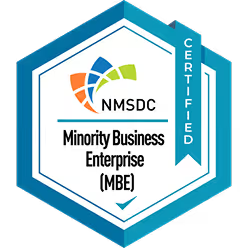
Copyright © 2025 WaferWire Cloud Technologies




.png)







